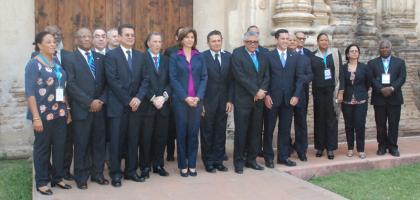The Association of Caribbean States is the organization for consultation, cooperation and concerted action in trade, transport, sustainable tourism and natural disasters in the Greater Caribbean. Its Member States are Antigua & Barbuda, The Bahamas, Barbados, Belize, Colombia, Costa Rica, Cuba, Dominica, Dominican Republic, El Salvador, Grenada, Guatemala, Guyana, Haiti, Honduras, Mexico, Jamaica, Nicaragua, Panama, St. Kitts & Nevis, St. Lucia, St. Vincent & the Grenadines, Suriname, Trinidad & Tobago and Venezuela. Its Associate Members are Aruba, Curacao, (France on behalf of French Guiana, Saint Barthelemy and Saint Martin ), Guadeloupe, Martinique, Sint Maarten, (The Netherlands on behalf of Bonaire, Saba, and Sint Eustatius ), Turks and Caicos.




